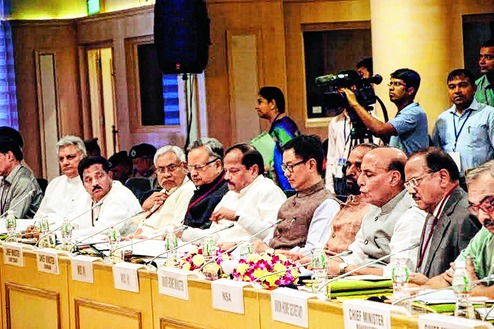
New Delhi, May 8: Chief minister Nitish Kumar today questioned the Narendra Modi government's anti-Maoists policy and accused it of stopping key development schemes that help thwart Left-wing extremism.
He also questioned the rationale for convening security review meetings with chief ministers of Naxalism-affected states when the Centre was not releasing funds.
He was speaking at the meeting that Union home minister Rajnath Singh chaired and top brass of the security establishment of the 10 Maoist-affected states attended along with senior ministry officials.
Six out of the 35 districts across the country the Union home ministry has identified as most affected by Left-wing extremism are in Bihar: Gaya, Aurangabad, Nawada, Jamui, Banka and Muzaffarpur.
During the review meeting, Nitish highlighted that the UPA government had introduced some schemes for capacity enhancement of security forces and to address local disparity in the Maoist-affected states, such as the special infrastructure scheme 9SIS), integrated action plan (IAP), and security related expenditure.
"These schemes produced good results," Nitish said. "Since last year the SIS and IAP schemes have been discontinued and ironically this happened when we were hoping that the government would further strengthen these schemes and enhance resources." Stopping funding in these schemes has adversely affected developmental work, especially under these schemes, in affected districts, he insisted.
He also berated the Centre for reducing funding in the plan component for modernisation of the police force to equip the state police with technology, training and modern gear to face threats like Maoist guerrillas.
"From the year 2000-2001 to 2014-2015, the Centre provided funding under the scheme to the tune of Rs 40 crore annually and subsequently it was reduced to Rs 25 crore," Nitish said.
For a state like Bihar the ratio of Centre to state funding should be 90:10 and not 60:40, he said. He also claimed that Bihar had requested the Union home ministry for the deployment of a helicopter but the ministry turned down the proposal and instead asked the state to use the chopper deployed in Jharkhand as and when need arises.
Under the federal structure of country, Nitish said, the Centre cannot relegate itself to a mere reviewing role by throwing the ball in the court of the states for taking effective action to neutralise the Maoist threat which has emerged as a challenge to internal security.
"If effective steps in the real sense are to be taken, then mere discussion with the state governments will not suffice and the Centre will also need to take concrete steps. Financial grants will need to be continued for the schemes initiated earlier... And their size and scope will need to be broadened. In case the Centre decides to discontinue or reduce grants, it will have a detrimental effect in the fight against Left-wing extremism," he said, stressing that charging the states with 100 per cent financial burden for deployment of central paramilitary forces was also devoid of logic.
"The ultimate objective cannot be achieved if needs of states are not adequately addressed," Nitish said.
The fight against Maoists is a joint responsibility of the states and the Centre but all expenses are borne by state governments, he said, and emphasised that these expenditures should be jointly shared.
He also slammed the Centre for stopping the funding for three counter-insurgency and anti-terrorist schools with effect from 2015-16. The UPA government had started the schools in 2010 to make state police ready for anti-Maoist operations.
"It is ironical that on one side capacity building and training of security forces are being emphasised while on the other hand the Centre has already stopped funding to training centres," Nitish said. "This contradiction in approach will not lead to any solution. If all works have to be done by states with their own resources then what purpose will be served by this meeting?"










